
Crystal clear, glaze effect. It allows small objects to be encased. Can be coloured. Targeted to manufacturers and professional users.
Unlike the application of the low thickness epoxy resin, the application of medium thickness clear resin (1 cm to 3 cm) produces athicker glaze effect for agreatervisualsensation of depth.
Once the resin is cured, the material shows low yellowingover time. We added UV filters to provide long-term protection and resistance to yellowing. This resin is suitable for interioruse only.
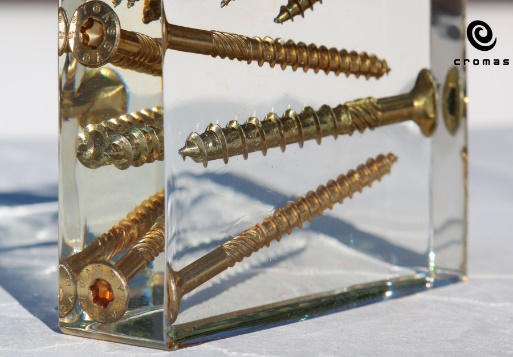
Crystal clear epoxy resin for medium thickness layers with encased small objects
High transparency epoxy resin for medium thickness layers with encased small objects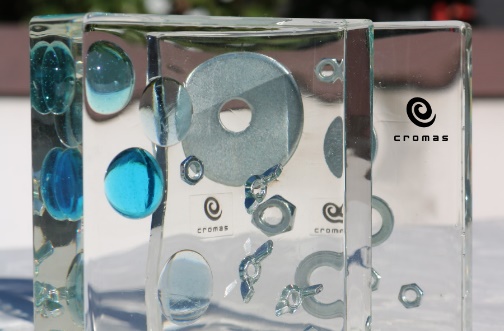
High transparency epoxy resin for medium thickness layers, encased small metallic objects are possible
Crystal clear epoxy resin for medium thickness layers, encased small metallic objects are possible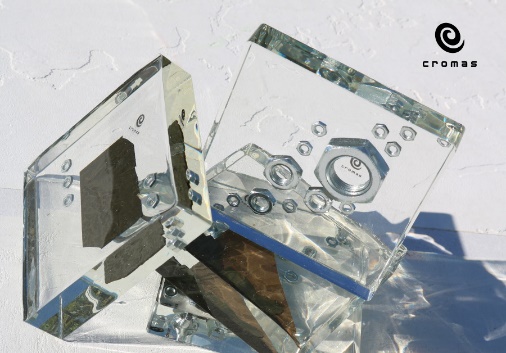
High transparency epoxy resin for medium thickness layers with encased small objects, suitable for metallic items
High transparency epoxy resin for medium thickness layers with encased small objects, suitable for metallic items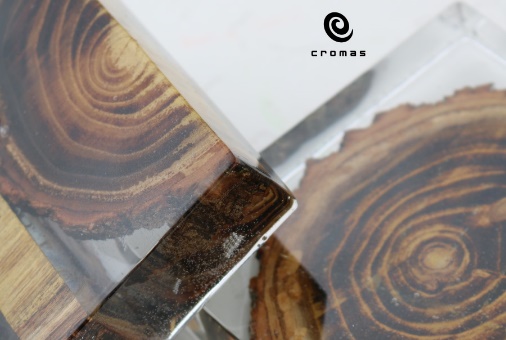
Crystal clear epoxy resin with medium thickness and encased small objects, suitable for wood
High transparency epoxy resin with medium thickness and encased small objects, suitable for woodSpecial coloured epoxy resins have been developed to achieve brilliant and burnished hues that are alsocrystal clear
With Cromas Paints scientific experience in producing special effect paints, we have developed our resins for professional applications. Many other resins are intended for a DIY customer.
The Cromas resins werescientifically developed to feature these professional characteristics:
- A Low Viscosity and isBalanced – the material is self-leveling at low thickness
- A high resistance to Carbonation – the reaction of the resin hardener with the air and humidity that can cause defects in the surface
- Resistant to UV rays and is Low Yellowing
- Calculated Mass Effect – the temperature rise of the curing resin – tested on common furniture surfaces
The resins allow users to insert various small objects in to a mixture of at least 2 cm in thickness. Even metallic materials can be encased because the curing temperature of the resin in not high enough for the metallic object to expand.
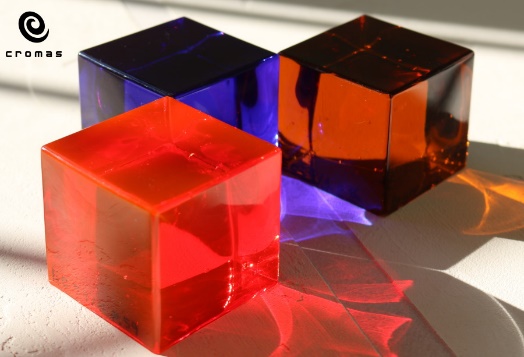
Crystal clear and colourful epoxy resin for 2 cm to 3 cm in thickness with encased small objects
High transparency colored epoxy resin for 2 cm to 3 cm in thickness with encased small objects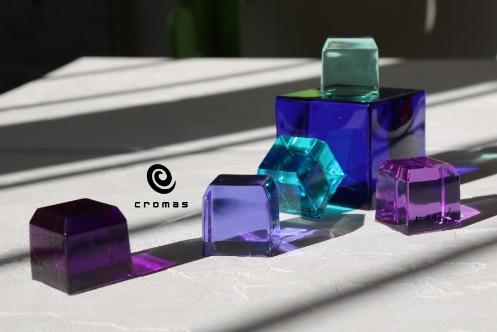
High transparency colored epoxy resin for 2 cm to 3 cm in thickness with encased small objects
Crystal clear and colourful epoxy resin for 2 cm to 3 cm in thickness with encased small objects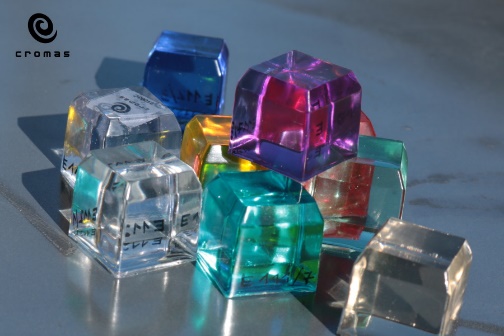
Crystal clear and colourful epoxy resin for 2 cm to 3 cm in thickness with encased small objects
High transparency colored epoxy resin for 2 cm to 3 cm in thickness with encased small objects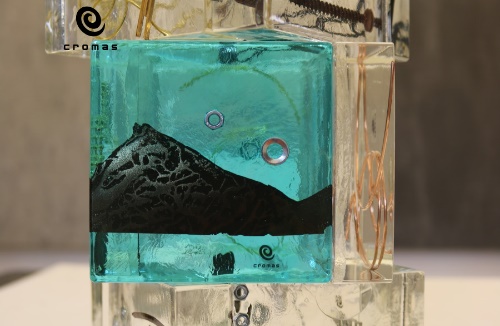
High transparency colored epoxy resin for 2-3 cm thickness and small encapsulations
Crystal clear and colourful epoxy resin for 2 cm to 3 cm in thickness with encased small objectsGeneral and important information about resin application techniques
Once the resin is fully hardened it becomes a unique glossy surface that is more durable and featuresa higher resistance than common lacquers due to the thickness. A frame or silicone mold is needed to hold and shape the resin while pouring. The mix has a low viscosity so the air bubbles can evaporate. The cured resin is then removed from the mold when dry.
After the medium thickness resin has fully hardened, it can be polished just like any common lacquered acrylic, polyurethane or polyester material. When polishing, it is important not to heat the resin surface too much with the polishing machine. An excessive amount of heat from polishing can lead to atemporary softening of the suface, and making it harder to polish. This problem can be solved through the application of clear acrylic after sanding with a 500/1000 grit sandpaper.
For applications with inserted objects such asuntreatedwood with open pores, it is necessary to seal or insulate the material first. As an alternative to common insulating products, apply 1 or 2 layers of epoxy insulating resin or sealer to achieve excellent results. Best results are obtained by using a high-viscosity insulating product (specifically studied by Cromas) applied with a brush or spatula.
The low thickness resins were designed for pouring on flat surfaces like standalone casting projects. These are called self-leveling resins. When pouring this resin, it is important that the surface is level so the resin thickness is equal in all parts of the surface.
The medium thickness resin applications commonly have a cure time of 24-48 hours at a temperature of 20-25° C. For projects with an application of high thickness resins, the temperature rise during curing or Mass Effect must be kept under control as they determine the finish quality. For encased materials that are porous and may contain water or humidity – if the material is not well sealed or insulated – the wood material can create air bubbles from the heat of the curing resin.
The medium thickness resin can be applied on a larger or smaller surface area but the thickness of the resin will be different to control the Mass Effect. When this resin is used on a larger surface the thickness should be lower and when applied on a small surface the thickness can be higher. This method will control the Mass Effect or the amount of heat from the curing reaction. If there is too much hear, defects can occur.
For applications larger surfaces with a high thickness, it is recommended to use our high thickness resin.
♦ We suggest to read the following page:
Epoxy resin castings with air bubbles – details
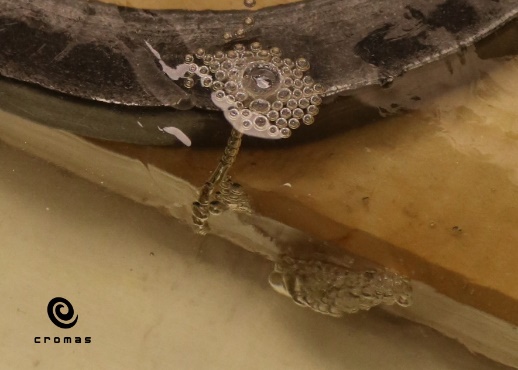
Air bubbles in epoxy resins on a not insulated material
Air bubbles in epoxy resins on a not sealed material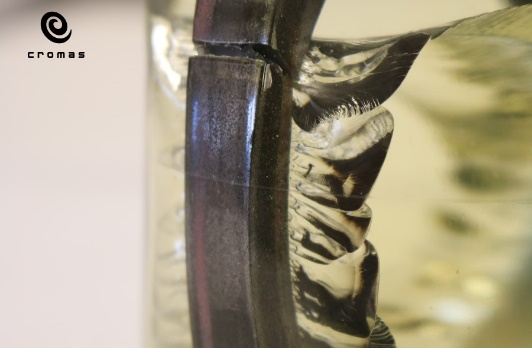
A mass effect example. Choosing an unsuitable resin for the project causes a heat reaction during curing
A mass effect example. Choosing an unsuitable resin for the project causes a heat reaction during curingAnd finally, more general information to help you be successful with your resin projects. The process of pouring resin to make a glaze effect is a simple process, but the use of resin with encased objects needs to be tested. Materials such as wood and metal can cause some working problems because some materials can move in the mixture or change in size due to temperature variations during curing. Normally metal expands as it gets warm and becomes smaller as it gets colder.
In winter, the application process of the resins must be carried out in a warm work environment. The recommended temperature during the curing or hardening time is at least 20° C. At lower temperatures, the curing time increases and some imperfections may appear on the surface. The recommended temperature during working time is 25°C and the temperature should remain the same during the hardening time. It is advised not to store the resin in a cold area during winter.
It is also suggested that the surface material, the encased items, and the working environment not be too humid. This is because too much moisture in the air or in the encased items can react with the mixture and cause defects. In order to assure the resin has good resistance to Carbonation, it is important that the working environment and items to be encased are moisture free.
The importance of pre-production testing
The application process of casting, self-leveling, or encasing objects in epoxy resins is not difficult, but our experience tells us that it is necessary to proceed with testing, to develop your standardized application process especially if there is no previous experience in resins. Cromas Paints goal is to give you the most useful information so your projects are successful. The provided information comes from our direct experience. Because there are many factors to consider, we always advise to proceed with product testing in a controlled working environment and using the same materials
Related products
-
![front image - Phosphorescent Epoxy Resin]()
Phosphorescent Epoxy Resin
![back image - Phosphorescent Epoxy Resin]()
Phosphorescent Epoxy Resin
-
![front image - Epoxy resin for three-dimensional decorations]()
Epoxy resin for three-dimensional decorations
![back image - Epoxy resin for three-dimensional decorations]()
Epoxy resin for three-dimensional decorations
-
![front image - Transparent coloured epoxy resins]()
Transparent coloured epoxy resins
![back image - Transparent coloured epoxy resins]()
Transparent coloured epoxy resins
-
![front image - Pure Metal metallic epoxy resins]()
Pure Metal metallic epoxy resins
![back image - Pure Metal metallic epoxy resins]()
Pure Metal metallic epoxy resins
-
![front image - Low thickness casting epoxy resins]()
Low thickness casting epoxy resins
![back image - Low thickness casting epoxy resins]()
Low thickness casting epoxy resins





